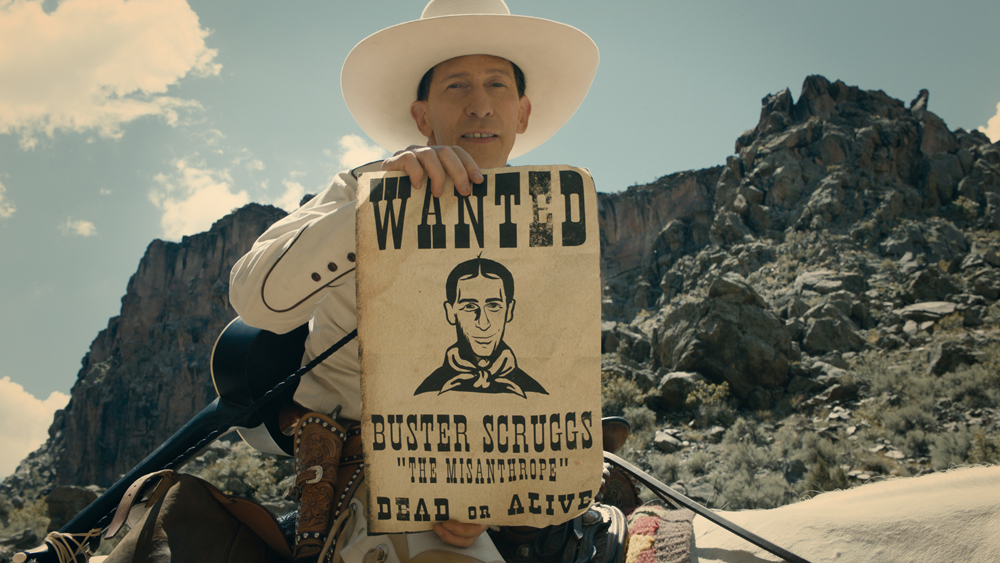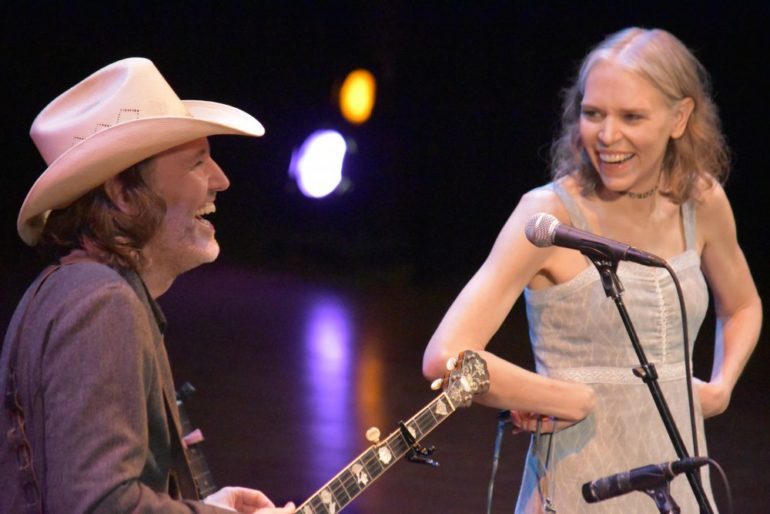How Gillian Welch and David Rawlings Turned the Coens’ ‘Buster Scruggs’ Into a Yodeling Musical-Comedy
By Chris Willman
LOS ANGELES (Variety.com) – The Coen brothers’ omnibus Western, “The Ballad of Buster Scruggs,” has some fairly grim stretches, but before it goes there, the first segment has a few moments of pure musical-comedy exhilaration. Singer-songwriter describes the assignment, as it came in to her and partner David Rawlings from the Coens. “It was a pretty straightforward thing: ‘Well, we need a song for when two singing cowboys gun it out, and then they have to do a duet with one of ‘em dead. You think you can do that?’ ‘Yeah, I think we can do that’,” she laughs.
It was an opportunity to do more of a throwback pastiche than Welch and Rawlings would ever do for their own purposes as serious Americana heroes. “The more peculiar restraints you put upon a song, the more fun it is, so this was kind of a dream assignment,” Welch says. “And they didn’t tell us to do this, but if you’re writing a gunfight song between two singing cowboys, who wouldn’t love the opportunity to put some yodeling in?”
This wasn’t their first time writing for the Coens, but there were some snags in the earlier efforts. “Nobody But the Baby’ (on the “O Brother Where Art Thou?” soundtrack) was the first thing,” she says. “The credits for that got messed up because of legal stuff, but that was technically the first original thing that I wrote for them for a movie. and then they asked us to take a swing at writing a song for the big dance number in the Hollywood movie.” (The directors ultimately rejected the proposed song for that “Hail Caesar” as too specific or comical, but they have told the songwriters they pull out the demo whenever they need a laugh.) For this fully consummated assignment, Welch says, “There was no specific template song, but I just couldn’t love ‘Streets of Laredo’ any more, so some deeper gestalt of that song hopefully informed our song.”
Rawlings loved the deadpan nature of a scene that is a duet between the living and the ascending, newly dead. “That’s a beautiful thing about the cowboys — one just shot the other, but they’re very stoic about it,” he laughs. “They understand all gunfighting cowboys all eventually get gunned down, so there’s a great camaraderie in it. We tried to play up sense of inevitability with both gunfighters. You know, the gunfighter that gets shot doesn’t blame the other one, and the new fastest gun in town kind of wistfully knows that this is where he’s headed, also.”
The songwriting team had some fun with language. “We tried to put every cowboy word we knew,” Welch says, “and in fact one we made up, in the great tradition of Chuck Berry.” Oh, which word was that, we ask? “I’m not going to tell you,” she laughs.
Fortunately for those of us who aren’t willing to do the linguistic digging, Rawlings is more forthcoming, in his separate interview. “We wanted it to have a little bit of that feeling that some old-time songs give you where there’s kind of like an archaic language being spoken,” he says. “We were like trying to search for a word in the second verse — ‘When they wrap my body and when they take me away…’ — and we couldn’t really find the right word. So we used the word ‘bindling,’ which doesn’t exist. We just invented a word that would sound like something you might wrap a cowboy’s body in, that gives you that feeling of a world that you don’t quite understand. And this is one of these things I love doing in song: I love inventing a word and throwing it in a song, because people give you the benefit of the doubt, and then you have successfully put something in a song that no one understands, but they assume that you do.”
They liked the song enough to throw it into some of their live sets this year, well in advance of the movie’s release. “It’s a little bit on the fringes of our of our set,” as a comedic pastiche amid more sober material, Welch acknowledges, “but it definitely went over well with everyone every night, and some nights, every punch line got a good laugh.” (Like? “There’s an obvious joke at the end of the second verse: ‘I’ll be halfway to heaven under horsepower of my own.’”) Says Welch, “I don’t really get to yodel enough on stage, so it’s a nice thing to throw in.
Having been friends with the filmmakers for so many years now, Welch and Rawlings have occasionally asked the Coens for advice on how they get their creative work done as a duo. “I guess we don’t bump into that many writing teams who you feel understand what you do immediately without having to talk about it,” says Rawlings. Adds Welch, “In a weird way, I feel like there’s nobody on the planet who works as similarly to how Dave and I work as Joel and Ethan do, even though it’s in a different field. Sometimes when we have really esoteric questions about our creative process, one of us will call one of them: ‘Hey, what do you guys do when this happens?’ And there’s usually a parallel. Creative writing teams are very mysterious.”


